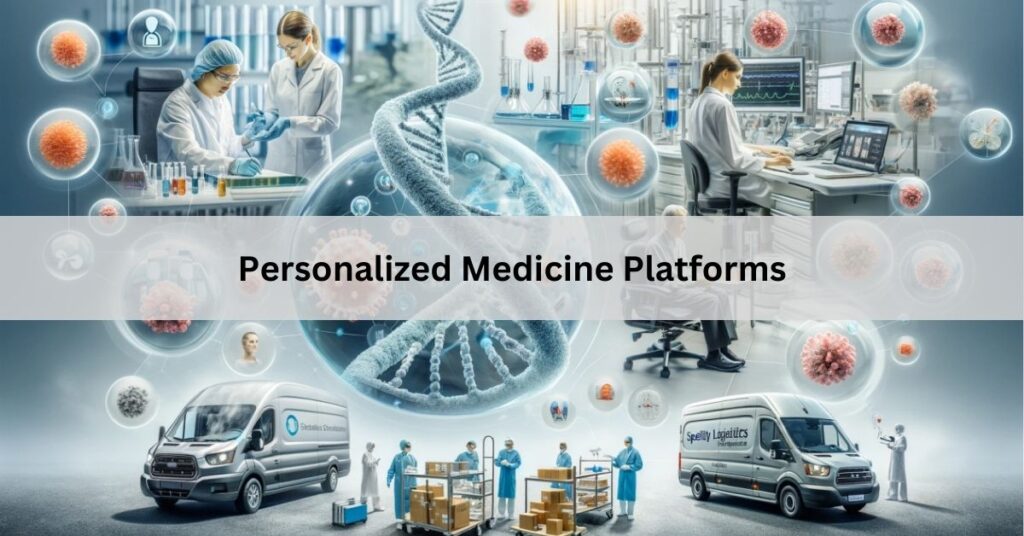Introduction
Personalized medicine platforms are transforming the healthcare landscape by tailoring treatments to individual patients based on their genetic, environmental, and lifestyle factors. This approach promises more effective and targeted therapies, reducing the trial-and-error nature of traditional medicine. In this comprehensive guide, we will explore the benefits, technologies, challenges, and future trends of personalized medicine platforms.
What is Personalized Medicine?
Definition and Overview
Personalized medicine, also known as precision medicine, involves the customization of healthcare treatments to the individual characteristics of each patient. This innovative approach considers genetic, environmental, and lifestyle factors to develop tailored treatment plans, moving away from the “one-size-fits-all” model of traditional medicine.
Importance in Modern Healthcare
Personalized medicine is crucial in modern healthcare because it allows for more accurate diagnoses, improved treatment outcomes, and reduced side effects. By understanding the unique aspects of each patient, healthcare providers can offer more effective and safer therapies.
Key Technologies in Personalized Medicine Platforms
Genomic Sequencing
Genomic sequencing is the cornerstone of personalized medicine. It involves analyzing a patient’s DNA to identify genetic variations that may influence their risk of disease or response to treatment. Techniques like whole-genome sequencing (WGS) and whole-exome sequencing (WES) are widely used to uncover genetic information crucial for personalized treatment plans.
Bioinformatics
Bioinformatics combines biology, computer science, and information technology to analyze and interpret complex biological data. Personalized medicine platforms use bioinformatics to manage and analyze genomic data, helping to identify patterns and correlations that can guide treatment decisions.
Artificial Intelligence (AI)
AI plays a significant role in personalized medicine by processing vast amounts of data quickly and accurately. Machine learning algorithms can predict patient outcomes, identify potential drug candidates, and personalize treatment plans based on individual data. AI also aids in the discovery of biomarkers that can indicate disease progression or treatment response.
Pharmacogenomics
Pharmacogenomics studies how genes affect a person’s response to drugs. This field helps in understanding why certain medications work well for some people but not for others. Personalized medicine platforms use pharmacogenomic data to tailor drug therapies, ensuring that patients receive the most effective and safest medications based on their genetic makeup.
Benefits of Personalized Medicine Platforms
Improved Treatment Efficacy
One of the most significant benefits of personalized medicine is the potential for improved treatment efficacy. By tailoring therapies to the individual’s genetic profile, healthcare providers can choose the most effective treatments, leading to better outcomes and faster recovery times.
Reduced Adverse Reactions
Personalized medicine reduces the risk of adverse drug reactions by considering the patient’s genetic makeup when prescribing medications. This approach ensures that patients receive drugs that are less likely to cause harmful side effects, improving overall treatment safety.
Early Disease Detection
Personalized medicine platforms can identify genetic predispositions to certain diseases, allowing for early detection and preventive measures. Early intervention can significantly improve patient outcomes and reduce the overall burden of disease on the healthcare system.
Cost-Effectiveness
Although the initial cost of personalized medicine platforms can be high, they can lead to long-term cost savings by improving treatment outcomes and reducing the need for multiple, ineffective therapies. Early detection and targeted treatment can also reduce the overall cost of managing chronic diseases.
Challenges in Implementing Personalized Medicine
Data Privacy and Security
Handling vast amounts of sensitive genetic data raises significant privacy and security concerns. Ensuring the confidentiality and protection of patient information is crucial to maintaining trust and compliance with regulations like the Health Insurance Portability and Accountability Act (HIPAA).
High Costs
The costs associated with personalized medicine, including genomic sequencing and advanced analytics, can be prohibitive. While prices are decreasing over time, the initial investment can still be a barrier for widespread adoption, particularly in low-resource settings.
Integration with Existing Healthcare Systems
Integrating personalized medicine platforms with existing healthcare systems and workflows can be challenging. Healthcare providers need to adapt to new technologies and approaches, which can require significant training and changes in practice.
Ethical Considerations
Personalized medicine raises various ethical issues, including the potential for genetic discrimination and the implications of genetic testing results. Addressing these ethical concerns is essential to ensure that personalized medicine is implemented responsibly and equitably.
Successful Case Studies
Oncology
Personalized medicine has shown significant promise in oncology, with treatments tailored to the genetic mutations driving cancer in individual patients. Targeted therapies, such as those for specific mutations in breast cancer (HER2) and lung cancer (EGFR), have improved treatment outcomes and survival rates.
Cardiovascular Diseases
In cardiovascular medicine, personalized approaches can identify patients at high risk of conditions like heart disease and stroke. Genetic testing can guide the use of preventive measures and treatments, such as statins and anticoagulants, improving patient outcomes and reducing the incidence of cardiovascular events.
Rare Genetic Disorders
For patients with rare genetic disorders, personalized medicine can provide a diagnosis and treatment plan that was previously unavailable. Advances in genomic sequencing have enabled the identification of rare mutations, leading to targeted therapies and better management of these conditions.
Future Trends in Personalized Medicine
Integration of Multi-Omics Data
The integration of multi-omics data, including genomics, proteomics, metabolomics, and transcriptomics, will provide a more comprehensive understanding of disease mechanisms and patient responses. This holistic approach will further enhance the accuracy and efficacy of personalized treatments.
Advances in AI and Machine Learning
As AI and machine learning technologies continue to evolve, their application in personalized medicine will become even more sophisticated. Improved algorithms will enhance the ability to predict patient outcomes, identify new drug targets, and optimize treatment plans.
Increased Accessibility
Efforts to reduce the cost of genomic sequencing and expand access to personalized medicine platforms will make these technologies more widely available. Increased accessibility will ensure that more patients benefit from personalized treatments, regardless of their socioeconomic status.
Regulatory and Ethical Frameworks
The development of robust regulatory and ethical frameworks will be crucial to address the challenges associated with personalized medicine. These frameworks will ensure the responsible use of genetic data, protect patient privacy, and promote equitable access to personalized treatments.
Conclusion
Personalized medicine platforms represent a significant advancement in healthcare, offering tailored treatments that improve patient outcomes, reduce adverse reactions, and enable early disease detection. While challenges such as data privacy, cost, and integration with existing systems remain, ongoing technological advancements and the development of ethical frameworks promise a future where personalized medicine is accessible and effective for all. Embracing these platforms will revolutionize the way we approach healthcare, making it more precise, efficient, and patient-centered.

















